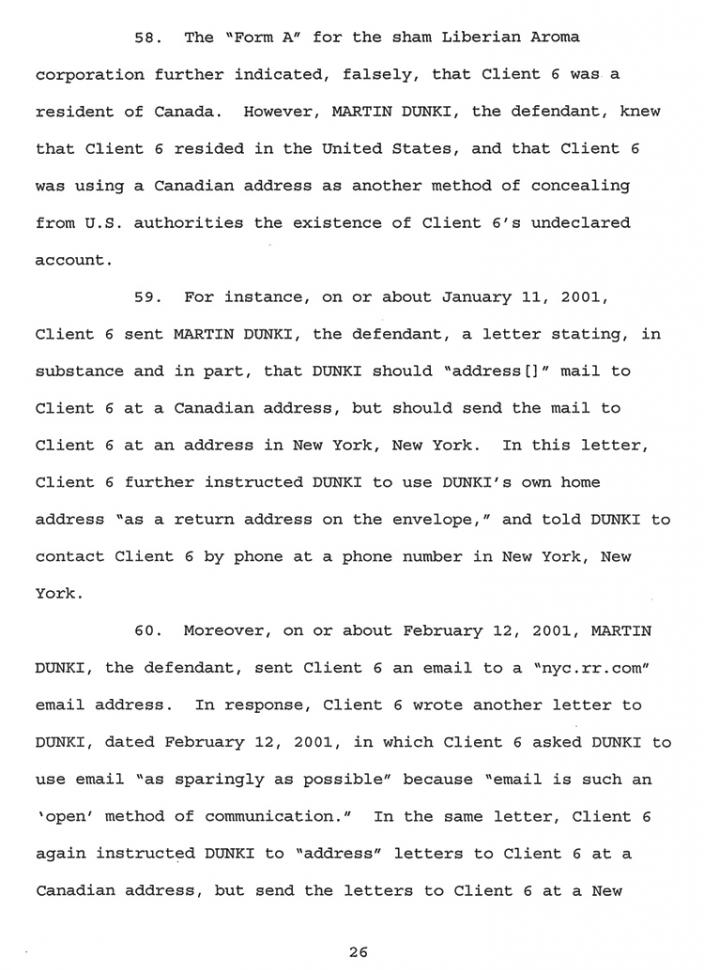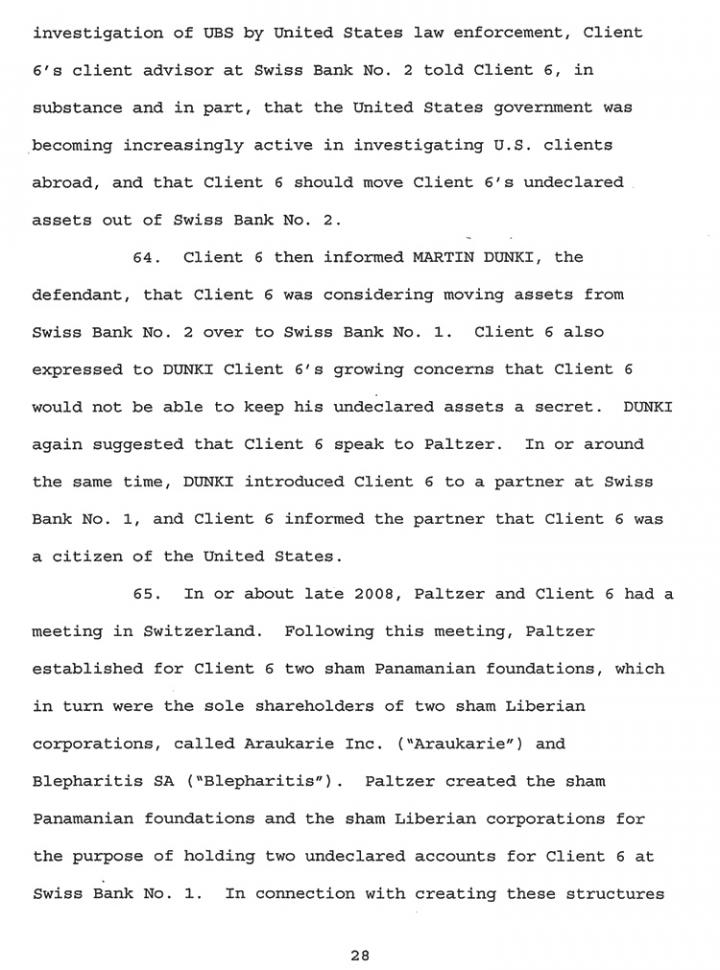Tax Cheat Hid $300 Million In Swiss Accounts
Help unmask the greedy fat cat dubbed "Client 6"

View Document
MARCH 16--Despite hiding $300 million in a series of undeclared Swiss bank accounts, a scheming U.S. taxpayer has avoided criminal prosecution thanks  to an Obama administration program that has granted the fat cat anonymity in the face of fraudulent and felonious conduct spanning more than a decade.
to an Obama administration program that has granted the fat cat anonymity in the face of fraudulent and felonious conduct spanning more than a decade.
Like thousands of other individuals who hid assets in offshore accounts, the obscenely wealthy taxpayer approached the Internal Revenue Service and belatedly disclosed that he had “falsely and fraudulently” failed to report massive Swiss holdings.
Instead of being arrested and indicted, the taxpayer--identified as “Client 6” in a court filing--was only subject to a stiff penalty imposed as part of the IRS’s Offshore Voluntary Disclosure Program (OVDP). The initiative’s March 2009 launch coincided with Department of Justice criminal probes into Swiss banks that were aiding U.S. residents in illegally evading taxes.
The original OVDP lasted about six months and prompted 15,000 taxpayers to disclose secret accounts (for which a 20 percent penalty was levied). A second OVDP--this time carrying a 25 percent penalty--ran for seven months in 2011 and resulted in 18,000 disclosures, according to IRS records. A third, open-ended OVDP began in January 2012 and carries a 27.5 percent penalty.
The IRS contends that voluntary disclosure of undisclosed foreign accounts and assets is beneficial because it allows a taxpayer to become “compliant,” minimizes civil penalties, and will “generally eliminate the risk of criminal prosection.” The federal government has also profited from the programs, banking more than $6 billion from taxpayers who disclosed their foreign holdings.
“Client 6,” records show, did not disclose Swiss accounts until June 2013--more than four years after the original OVDP application period opened. As federal investigators probed UBS, HSBC, and other banks, “Client 6” moved funds between Swiss banks and set up sham Panamanian foundations that owned similarly dubious Liberian companies that, in turn, held the undisclosed Swiss accounts.
The egregious machinations of “Client 6” are detailed in a federal conspiracy indictment filed against Martin Dunki, a 66-year-old Swiss citizen who worked  as a client advisor at Rahn & Bodmer, a Swiss bank founded in 1750. Dunki, who helped “Client 6” open an undeclared account at Rahn & Bodmer in 2000, served as the U.S. taxpayer’s advisor until 2012, when he retired from the Zurich-based bank.
as a client advisor at Rahn & Bodmer, a Swiss bank founded in 1750. Dunki, who helped “Client 6” open an undeclared account at Rahn & Bodmer in 2000, served as the U.S. taxpayer’s advisor until 2012, when he retired from the Zurich-based bank.
While “Client 6” perfectly fits the description of a criminal coconspirator, federal officials have opted to primarily pursue felony charges against Swiss banks and foreigners who aided in tax evasion by U.S. citizens (who, via the OVDP, were given the option to pay their way out of trouble).
Like other taxpayers who hid their foreign accounts before fessing up, “Client 6”--who filed 13 years worth of fraudulent tax returns--has successfully remained in the shadows, thanks to the blanket confidentiality offered by IRS and Department of Justice officials.
But such perfidy by a member of the one percent--whose net worth surely dwarfs the $300 million stashed in Switzerland--demands a public outing of “Client 6.”
While TSG has, so far, been unsuccessful in identifying the affluent tax cheat, a crowdsourcing effort appears likely to unmask “Client 6,” who apparently believes that paying taxes is for the little people.
So, review the following details about “Client 6” that are contained in the Dunki indictment and start your sleuthing (click here to read the five pages  federal prosecutors devoted to “Client 6”). Your analysis, tips, and research breakthroughs can be forwarded to TSG at [email protected]. All submissions will remain confidential.
federal prosecutors devoted to “Client 6”). Your analysis, tips, and research breakthroughs can be forwarded to TSG at [email protected]. All submissions will remain confidential.
While the Dunki indictment attempts to hide the sex of “Client 6,” a single slip up identifies the taxpayer as a male. The taxpayer’s age is unknown.
Other details about the tax cheat will be valuable in identifying him. Such as:
* “Client 6” is a dual citizen of Canada and the United States.
* At all times relevant to the Dunki indictment--roughly from 2000 to 2013--“Client 6” resided in “New York, New York” and Fisher Island, the exclusive 193-acre island across from Miami Beach. “New York, New York” apparently refers to Manhattan.
* In February 2001, Dunki sent an e-mail to “Client 6” at an “nyc.rr.com” address. The taxpayer, however, advised the Swiss banker to use e-mail “as sparingly as possible” since it was “such an ‘open’ method of communication.” Instead, “Client 6” instructed Dunki to address letters to a Canadian address, but mail the correspondence to New York (where the taxpayer also had an office).
* “Client 6”’s first account at Rahn & Bodmer was opened in the name “Aroma,” a Liberian corporation. The name’s significance is unclear, though it could easily be an off-the-shelf paper company.
* According to the indictment, as U.S. officials began cracking down on Swiss banks, Dunki became concerned that “Client 6 would not be able to keep his  undeclared assets a secret.” While prosecutors had been careful to avoid identifying “Client 6” as a male or female, that stray “his” reduced the number of possible tax evaders.
undeclared assets a secret.” While prosecutors had been careful to avoid identifying “Client 6” as a male or female, that stray “his” reduced the number of possible tax evaders.
* In late-2008, “Client 6” hired Swiss lawyer Edgar Paltzer to create sham Panamanian and Liberian corporations to further shroud his ownership of the Swiss accounts. In connection with creating these firms, Paltzer corresponded with “Client 6” at his address in Fisher Island, where he was then residing.
Like Dunki, Paltzer was indicted for his role in helping U.S. taxpayers hide their foreign holdings from tax authorities. While Dunki remains in Switzerland, safe from extradition, Paltzer flew to New York for arraignment on a felony conspiracy charge. He subsequently cooperated with federal investigators and provided details about his work with U.S. taxpayers, including “Client 6.”
Contacted by e-mail, Paltzer (seen above) declined to discuss his case in advance of sentencing, which is scheduled for April 10. “Until such time I am not allowed to discuss or comment on the ongoing matter. Please accept my apologies for not being able to assist you with your story,” wrote Paltzer. (5 pages)











